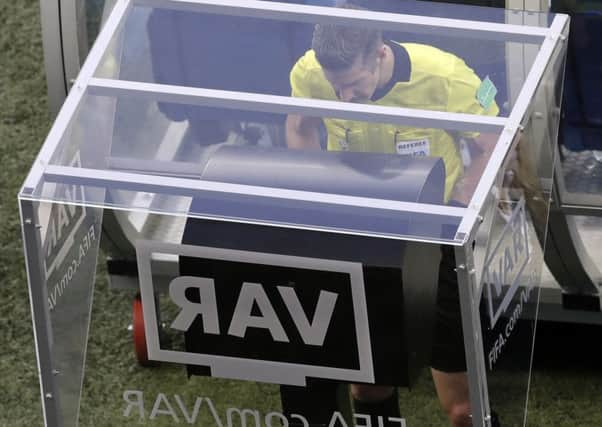VAR needs fine-tuning but more of it, not less, is way forward


Not a peep, mind you about the abuse of the official himself, about the hounding, baiting, bullying hostility of the mob seeking to influence outcomes in their favour. Nothing from managers about their diving, conniving, cheating little darlings, whose craven simulations in an attempt to con the referee are frequently the very acts that invoke the use of VAR in the first place.
You don’t need VAR to establish the truth of the inhospitable, counterproductive, imbecilic environment in which referees are asked to toil. If players really want officials to come to the right decisions, they might start by winding in their brass necks and stop bleating like bellyaching children when things do not go their way.
Advertisement
Hide AdAdvertisement
Hide AdVAR is self evidently a good thing since for the most part it gets to the bottom of things. Where it struggles is in matters of contact. Slowing the action down establishes contact but not its weight. It is therefore bounced back to a human being, if you will allow the referee to be labelled such, to interpret the actions of boneheads engaged all too often in the practice of cheating each other.
There is always a bright side, however. An early shout-down of VAR was the aching lament over interference with the traditional rhythms of the game and the fear it would kill the drama by distilling natural talking points into clinical evaluations of data. Well, forgive me. To my old mince pies it appears the opposite was true in Saransk, where Paraguayan referee Enrique Cáceres was invited to establish the force of Ronaldo’s forearm smash on Iran’s Morteza Pouraliganji and in the dying minutes to untangle Iran’s late penalty claim when Cedric was adjudged to have handled the ball. For the television viewer at least the histrionics augmented the show no end. And this is what is so ridiculous about the position taken by VAR’s critics. Those at home have been engaged in the VAR process for years courtesy of TV replays that take us through each incident in super-slow-mo detail. It always seemed crazy to me that the rule-makers would deny referees the eyes that cameras effectively give the viewer. And it does not take a jiffy to get to the truth of 99 per cent of incidents because at home and in the TV studio we are not being chased about the sofa by a pack of rabid dogs, teeth bared, breathing spite and fury.
Were the players to let the referee get on with it a conclusion would be reached in no time. And you can’t tell me that the suspense building around Ronaldo’s red card was not exquisite entertainment. For what it’s worth, I’m with Queiroz. You can’t be a little bit pregnant. An elbow in the chops is red. Ronaldo got away with that, but that is not the fault of VAR. Were it not for VAR the incident might never have been investigated in the first place.
In previously making the case for VAR I argued that the problem with its introduction was its limited application. Football’s stakeholders should have committed to it in the way they have in cricket and rugby by making available to the viewer and the punter in the stand the video being scrutinised by the referee and the audio between the man in the middle and those in the VAR camera suite. Transparency leads to understanding and entertainment.
Better still, since sovereignty over decisions requiring video assistance has ultimately passed from the referee to the VAR suite anyway, we should go the whole hog and let the VAR official who alerts the referee to actions he has missed be the ultimate arbiter in the dispensing of justice. Then we could rid the referee of the unnecessary requirement to nip to the side of the pitch to commune with his telly.
More VAR not less. That is the way forward.